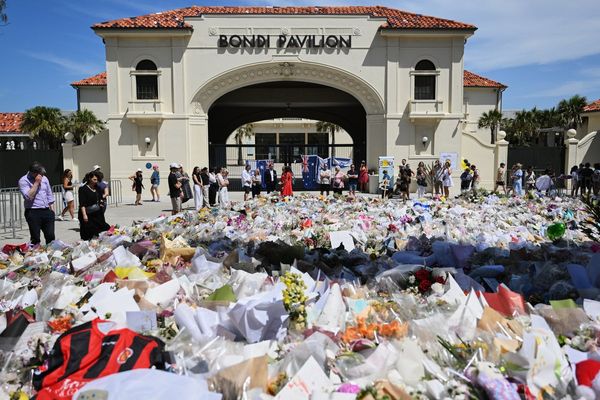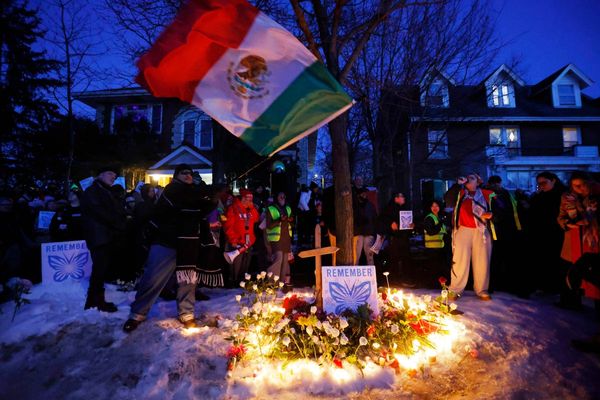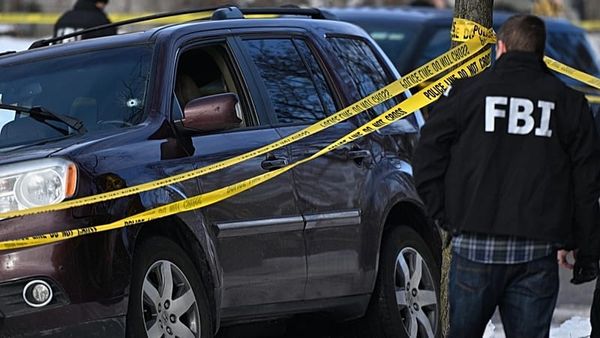
One Friday last month a demonstration was held outside the Port Talbot steelworks in south Wales, protesting the closure of the site’s two main blast furnaces. The demonstration was peaceful, passed off without incident and earned a brief mention on the evening news. But suppose for a moment that it had gone the other way. Suppose it spiralled into violence and sparked a full-blown Welsh rebellion. In which case, Port Talbot is no longer a fading industrial town. It’s a hotbed of revolution; a signpost to the future.
This, in a nutshell, is the premise of The Way, a boisterous BBC drama about a parallel Britain that’s just a shuffle step from our own. It’s a tale of civil war and family strife, a series that installs a militarised hard border between England and Wales and effectively turns all the Celts into outlaws. It used to be that people visited border town Hay-on-Wye to buy books. Now they come seeking shelter and a secret route into England.
The Way was devised and directed by the actor Michael Sheen. He recruited Sherwood author James Graham to write the script and convinced the documentary film-maker Adam Curtis to step in as an executive producer. But he also cast his home town as the drama’s chief location, the molten core of his tale. “The thing about Port Talbot is that it’s haunted by the ghosts of uprisings past,” he explains, of the bullish 20th-century steel town turned scrappy, post-industrial survivor. “It’s got that dormant rebel spirit in its DNA. The whole town feels like a dragon slumbering in a cave.”

Sheen, like Richard Burton and Anthony Hopkins before him, graduated from Port Talbot to pursue a lucrative acting career in London and Los Angeles. Unlike them, though, he has since circled back and now lives locally. He thinks that the catalyst was the acclaimed 72-hour production of The Passion that he staged in the town back in 2011. It reconnected him with his roots, helped him understand the place in the round.
“So that feeling of coming back to my home town and it also being a set is something I’d experienced before,” he says. “The difference was that this production took longer. This involved me shutting down the high street for a week. Obviously, people aren’t going to be so nice about that. But I knew I had a bit of trust left over from The Passion that I could still use up.”
The Way bustles around town like a native, steering us from the plant to the shops to the suburbs to the beach as the protests spread and the police crack down. Its focus, though, is on the revolutionary Driscoll family (estranged mum and dad; troubled adult siblings) as they escape through Afan Forest Park with the British army in hot pursuit. Each Driscoll, in their way, has been shaped and scarred by the steelworks. It’s almost like a relative: the mean old uncle in the corner.
Cardiff-born Mali Harries plays the role of Dee Driscoll, the tale’s redoubtable Mother Courage. Harries recalls being driven past the steelworks as a kid. She was spooked by the size and the noise and the stink. “Massive towers. Lots of steam. I used to dream about getting a giant Berocca tablet to put down the chimneys and clean all the pollution.” From afar, she admits that the place looks ominous. “But once you get into the community you see it’s full of heart, generosity and good humour. As a child you see the towers and the smoke. As an adult you get to see all of the people as well.”
Rhondda-born Callum Scott Howells co-stars as Owen, the Driscolls’ upstart addict son. He suspects that he, too, tended to steer clear of the place in his youth. “The closest I got to Port Talbot was passing through it on the way to walk the Mumbles Mile with my parents,” he says. “You drive past on the M4 and the steelworks just tower over the town, so it’s not the obvious place for a day trip. It’s only now that I realise it’s really not too different from where I’m from, which is an old mining community. It’s all part of the same post-industrial Welsh landscape.”

Howells remains best known for his performance as Colin, the tragic valleys kid from Russell T Davies’s It’s a Sin. Ideally, he says, he would like to shoot more roles in south Wales. There is a rich seam of Welsh stories just waiting to be told. The difficulty comes in transporting them, intact, to the screen. “That’s what’s so unusual about The Way,” he says. “It’s an epic tale on an epic scale. It shows we can tell these big stories in Wales, using Welsh actors and a Welsh crew, without diluting them one bit. Hopefully it raises the bar for what Welsh television can do.”
Back in the drama, the Driscolls are in flight. They’re steering their slaloming course along the Welsh border while the story keeps pace, zig-zagging wildly beside them. The scenery keeps shifting. The script grinds its gears. The Way sets forth as an urgent social-realist saga and then starts skipping through the genres without ever quite settling. It references The Wizard of Oz and WB Yeats’s The Second Coming. It’s an unruly rough beast; it keeps us all on our toes.
“Yeah, there’s a strange tone to it,” Sheen agrees. “You don’t know whether you’re in a horror film or a sitcom or a farce. We wanted it to be constantly surprising, to reflect what we’ve all been going through these last 10 years. The absurdity of reality. The situation that we’re in.”
This leads us inevitably to the desk of Adam Curtis, the creator of landmark documentaries Bitter Lake and The Power of Nightmares. Curtis is officially credited as The Way’s executive producer, which is another way of saying that he’s its touchstone, its mentor. A standard dystopian drama wouldn’t have interested him in the slightest. The Way’s skittish nature, though, proved to be its main selling point.
“Everyone has become so used to genres,” Curtis explains. “We sit in front of the TV screen and within 10 seconds we’re thinking: ‘Oh yes, it’s one of those.’ At which point everyone – the film-maker included – is trapped, because there is a contract in place that has to be honoured. Whereas this just gets odder and odder. It hints at how we may be able to break free from all the tired old structures that are holding us back.”

Curtis is ostensibly talking about TV drama here. But TV frames the wider world and he fears that our stories have become threadbare and exhausted. “This is an old country that’s being held back by old memories, old myths. All we are left with is a terrible nostalgia and a set of categories that don’t actually speak to the world we’re living in now.” The Way’s not dystopian, he says; that’s a lazy category error. Come to think of it, he’s not entirely happy with it being described as a Port Talbot tale either. “It’s more than that,” he cautions. “You can get too lost in that. I see it more as a parable of our country. It’s a story about our society that just happens to be set in Wales.”
One thing about home: we never truly escape it. It haunts us if we stay and it haunts us if we leave. That’s been Sheen’s experience. It’s what makes The Way feel so personal. “I mean, it’s a big political story,” he says. “But it’s also my story. It taps into all of my feelings about home.”
Off screen, Port Talbot faces an uncertain future. The blast furnaces are closing with the loss of nearly 3,000 jobs. Residents feel that the place may soon become a ghost town. On screen, if anything, the situation is more extreme. This parallel Port Talbot has become the revolution’s ground zero. It’s the war’s first battleground; possibly its first casualty, too.
“I remember reading about how HG Wells set The War of the Worlds in his home town of Woking,” Sheen says. “I think Edgar Wright did the same thing, setting Hot Fuzz in Wells. So there’s a small tradition that I’m now a part of, where people set stories in their home town and then blow it up.” He grins at the thought. “There’s something satisfying about turning the place where you grew up into an apocalyptic bombsite. Destroying your home town. But destroying it with love.”
The Way is coming soon to BBC iPlayer and BBC One.







